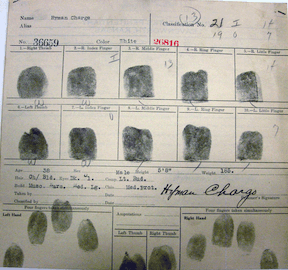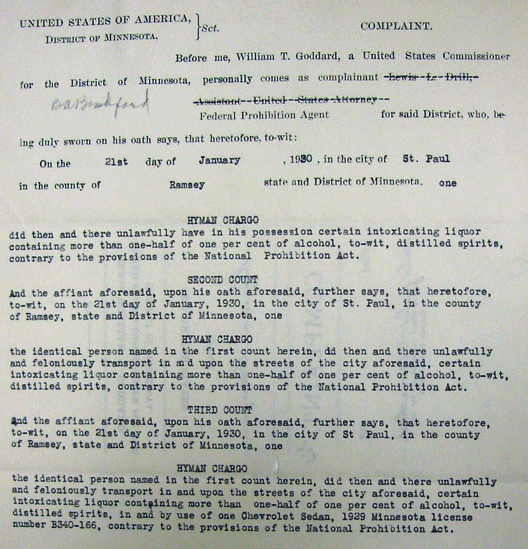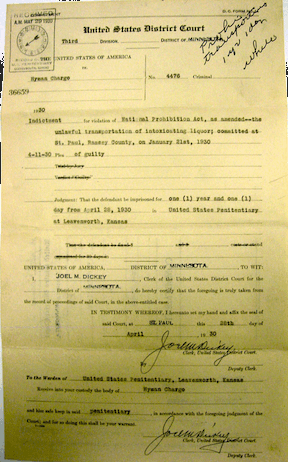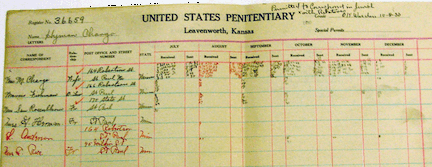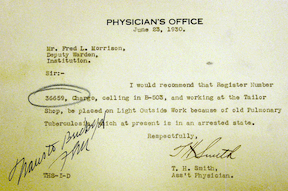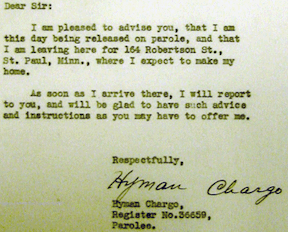|
|
Hyman Chargo and prohibition during the 1930's |
|
The following narrative tells the story Hyman Chargo's arrest, conviction, and incarceration for violation of the Volstead Act - Bootlegging - it is based on documents copied from the original that are stored in the National Archives, Kansas City, Missouri. Public Broadcasting System produced a 3 part history of Prohibition that explained how almost the entire nation was involved with violating the Prohibition laws. Everyone drank, made or bought bootleg booze. Unfortunately, some like Hyman were caught; most were not. We should be proud that one of the family was a part of our Nation's history. Most of you know that the Prohibition laws were repealed after being adjudged a total failure. The law made it legal to stock-pile booze before the law went into effect . . . and most rich individuals and organizations purchased twenty year supplies! It was only the average person who was made to suffer. The bootleggers played a vital role in providing alcohol to the everyday folks. PBS, the Public Broadcasting System, produced a 3 part history of Prohibition that explained how almost the entire nation was involved with violating the Prohibition laws. Everyone drank, made or bought bootleg booze. Cousin Herman Miller remembers Hyman was a bootlegger during prohibition. He had his neighbors set-up stills in their attics. He collected the booze, drove from St. Paul to Chicago and parked his car around Taylor Street (old Maxwell street area, now Univ of IL campus). He left the car with the booze and took a streetcar to Ben & Lena Miller’s house (Herman’s parents), 1023 N. Harding. The next day Hyman returned to his now empty car and drove back to St. Paul, Minnesota. In Minnesota, someone noticed all the steam coming from his neighbors attics and turned them in. Hyman was arrested and served six months in Fort Leavenworth, Kansas in 1930 (April to December when he was paroled); and he was arrested again in 1937 for violation of the National Revenue Act – usually a bootlegging charge – and served time at Sandstone Minnesota Federal Prison On January 16, 1920 the 18th Amendment to the Constitution, called the Volstead Act, making virtually all alcohol illegal went into effect. The law was repealed effective December 5, 1933 by the 22nd Amendment. This link lleads to a history of Prohibition located on the National Archives website: http://www.archives.gov/education/lessons/volstead-act/ which notes that, "The illegal production and distribution of liquor, or bootlegging, became rampant . . .." And on a related note, The Volstead Act was named for the chair of the Judiciary Committee, Andrew J. Volstead, U.S. Representative from the Minnesota 7th Congressional District.  AMENDMENT XXI During Prohibition Hyman was a bootlegger. Cousin Herman Miller remembers Hyman was a bootlegger during prohibition. He had his St. Paul, Minnesota neighbors set-up stills in their attics. He collected the booze, drove from St. Paul to Chicago and parked his car around Taylor Street (old Maxwell street area, now University of Illinois campus). He left the car with the booze and took a streetcar to Ben & Lena Miller's house (Herman's parents, his sister), at 1023 N. Harding. The next day Hyman returned to his now empty car and drove back to St. Paul, Minnesota. In Minnesota, someone noticed all the steam coming from his neighbors attics and turned them in. Hyman worked in St. Paul for Sam Rosenblum as a bakery route driver at 169-175 State Street. On January 21st, 1930 federal prohibition agents 'set him up' by having Alex Tabalich order alcohol for delivery to his house in St. Paul. Hyman was arrested after driving from his home at 154 Robertson, St. Paul, to 408 Maple, St. Paul and unloading five 5-gallon cans of moonshine whiskey at a garage at the house of the person who set him up. He was arrested while in the driveway while drinking from a glass of moonshine with his 'partner in crime' Jack Zinovich, who was in the car with him, and the person who set him up. Hyman was arrested for transportation of alcohol violations of the Volstead Act. On January 22nd he posted a $5,000 bail bond. On April 4th, 1930 a Grand Jury returned an Indictment, called a True Bill. On April 11, 1930 in the St. Paul, MN District Court, a bench trial was held - meaning no jury - and Hyman pled guilty and was sentenced to 'one year and a day' in the Federal Penitentiary at Fort Levenworth, Kansas. He arrived at Levenworth prision on April 28th, 1930 to start serving his sentence as prisoner #36659 assigned to cell B-503. He arrived age 38, weighing 167 pounds and 5 feet 8 1/2 tall, with a stooped posture and flat feet, and a few teeth out. He stated he went to school thru 10th grade in the old country. His fingerprint card after his arrest lists his weight as 185. His occupation was listed on documents as a cap maker, and on others as cabinet maker. During his stay he worked in the tailor shop (assigned on June 5th) and on the recommendation of the prison doctor, to the brickyard (assigned on June 25th) due to his arrested case of TB. He spent up to 5 months in the prison hospital due to possible ulcers; however, his tests were negative and he was not losing weight. Maybe he just liked being in the hospital ward and not his cell! Records show that he was in the prison hospital ward "C" September 13th, 1930. He worried a lot, either due to actual or perceived medical issues, or a desire to stay in the prison hospital. The prison doctor wrote, "This man is a very emotional individual and evidently is doing considerable worrying. His physical condition would greatly improve, if he would change his mental attitude, and make the best of his incarceration, which would, no doubt, make his time easier to serve. If Chargo were so inclined he could help himself considerably." His wife Nina was advised by the warden to tell Hyman to 'quit worrying' in a letter containing the doctors evaluation. On December 12th, 1930 Hyman was paroled, ultimately serving about 7 months due to good behavior (72 days of 'good time'). He returned to work for Oscar Kessel, President, National Banking Company, St. Paul. His wife, Nina, corresponded with the prison concerning Hyman's health. He claimed a history of TB, but no active case was detected. Interesting, his wife was advised that she should encourage Hyman to "not worry . . . ." He had only one visitor, his sister Ester on October 24th, and he received letters from only six people. He was allowed to correspond in 'Jewish' to family members. He was paroled on December 30, 1930, returning to St. Paul by train. On being paroled, he was given at total of $27.81: Discharge funds of $13.75 and his personal money consisting of $14.06. The car he used was confiscated and returned to the dealership. He had purchased the new 1929 1/2 ton Chevrolet sedan new from Kemper Chevrolet, St. Paul, MN on May 28th, 1929 for $867.60: $498 cash down, and 12 monthly payments of $30.80 (Total of $369.60) He still owed $184.80 when the car was seized. MN license plate B340-166; VIN 702658; SN 21AC51055. In 1937 Hyman was twice again charged with violating Federal law. FBI documents indicate he was arrested in St. Paul on January 26th, 1937 charged with violation of 'section 3296' and released on $1,500 bond. Correspondence suggests that there may have been some question as to whether or not his health would permit incarceration a second time. His second arrest was on March 4th, 1937 on Felony Registration (#F-108) but no charge listed. Details have been requested from the Kansas City NARA (National Archives Record Administration.)
|
Documents relating to Hyman's 1930 Minnesota criminal trial
|
Documents relating to Hyman's 1930 Leavenworth prison stay(Will open in new browser window or tab) |
|
